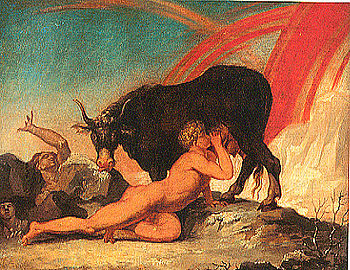Buri
- Buri
-
Búri
Buri ( qui sera appelé aussi Týr et Tuisto ) est selon la mythologie nordique le premier homme originel né de la vache Audhumla, qui en léchant le sel des rochers de Ginnungagap forma sa silhouette. Ses cheveux se dessinèrent le premier jour, le deuxième il eut une tête et enfin le troisième jour il fut achevé. Cet ancêtre des Dieux eut un fils, Bor, père d'Odin, Vili et Ve.
Voir aussi
Catégorie : Cosmogonie nordique
Wikimedia Foundation.
2010.
Contenu soumis à la licence CC-BY-SA. Source : Article Buri de Wikipédia en français (auteurs)
Regardez d'autres dictionnaires:
Búri — was the first god in Norse mythology. He was the father of Borr and grandfather of Odin. He was formed by the cow Auðumbla licking the salty ice of Ginnungagap. The only extant source of this myth is Snorri Sturluson s Prose Edda.Búri is… … Wikipedia
Buri — can refer to: * Taj al Mulk Buri, emir of Damascus in the 12th century. * Büri, Mongol prince in the 13th century. * Patrick Buri, Swiss French American businessman, financier, banker. * The Norse god Búri. * The Germanic tribe of the Buri. * The … Wikipedia
Büri — Buri was a son of Mutugen and a grandson of Chagatai khan. His name Buri means Wolf. According to Rashid Ad din, Buri s mother was a wife of Chagatai khan s one official. She was a beauty and Mutuken was attracted by her while she was serving in… … Wikipedia
Buri — Saltar a navegación, búsqueda Buri es lamido fuera del salado bloque de hielo por la vaca Auðumbla en este ilustración del siglo XVIII de un manuscrito islandés. Buri fue el primer dios en la mitología nórdica. Fue el padre de Bor y abue … Wikipedia Español
buri — burì interj., bùri Šv bure, buriu: Burì, burì (šaukia avis) Skr. Burì, burì, mano buriutė! Rdm. Bùri bùri, burikės, burelės mano! Ll. Bùri, bùri, bùri, ar nenori duonikės! Krkl … Dictionary of the Lithuanian Language
Buri — burí (Corypha umbraculifera) m. Cierta *palmera muy grande de Filipinas, de la cual se obtienen distintas cosas: de la médula del tronco, sagú; de las espatas de las flores, tuba; y de las hojas, una fibra textil que se llama también «burí», con… … Enciclopedia Universal
buri- — *buri , *buriz germ., stark. Femininum (i): nhd. Erhebung, Höhe; ne. hill, elevation; Rekontruktionsbasis: ae., ahd.; Etymologie: vergleiche idg. *bʰer (1), Verb … Germanisches Wörterbuch
BURI — memorati Iul. Capitolino in Marco Antonino Philos. c. 22. Gentes omnes ob Illyrici limite, usque Galliam conspiraverunt, ??? Marcomanni, Narisci, Hermunduri et Quadi, Suevi, Sarmatae, Latringes et Buri: hi aliique etc. Βούῤροι dicuntur Dioni in… … Hofmann J. Lexicon universale
buri- (1) — *buri (1), *buriz germ., stark. Maskulinum (i): nhd. Sohn; ne. son; Rekontruktionsbasis: got., an., ae.; Quelle: Personenname (1./2. Jh.); Etymologie: vergleiche … Germanisches Wörterbuch
Buri — (Burii), lygischer od. den Lygiern benachbarter Volksstamm im Quellenlande der Weichsel u. Oder; 167 n. Chr. Bundesgenossen der Markomannen gegen die Römer, später mit den Vandalen od. Slawen verschmolzen … Pierer's Universal-Lexikon
 Le géant Ymir boit le lait de la vache Audhumla tandis qu'elle lèche Buri pour le faire sortir du rocher. Peinture de Nicolai Abraham Abildgaard (1743-1809).
Le géant Ymir boit le lait de la vache Audhumla tandis qu'elle lèche Buri pour le faire sortir du rocher. Peinture de Nicolai Abraham Abildgaard (1743-1809).

